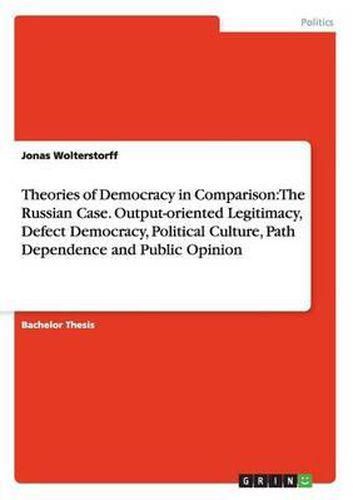Readings Newsletter
Become a Readings Member to make your shopping experience even easier.
Sign in or sign up for free!
You’re not far away from qualifying for FREE standard shipping within Australia
You’ve qualified for FREE standard shipping within Australia
The cart is loading…






Bachelor Thesis from the year 2013 in the subject Politics - International Politics - Region: Russia, grade: 1,3, Otto-von-Guericke-University Magdeburg (Institute for Political Sciences), course: Theories of Democracy, language: English, abstract: Russia is an enigma. In the western hemisphere, respectively the countries of the European Union and USA, it produces a lot of suspicion and resentments. Its vast spatial dimensions, in terms of size; its controversial history and its stubborn focus on sovereignty, when it comes to foreign policy and the international community, are the most prominent sources for difficulties of understanding. In addition, the Russian people liketo sustain a hint of mystery themselves, in claiming that no other nationality can understand them. Apart from stereotypes and prejudices about typical Russian people and characteristics, there are a handful of assumptions one encounters that cling to public opinion about Russia’s political landscape: (1) Political opposition does not exist, civic opposition is marginalised. (2) The independence of the judiciary system is a facade and de facto does not effectively monitor the executive. (3) The Soviet imprint on Russian people led to a mentality of subordination, inflexibility and obedience to any kind of authority. (4) The Russian media are corrupted and controlled by the Kremlin. (5) Putin only won the election due to massive vote manipulation. In line with the mentioned assumptions, Western media coverage tends to be polemic and jaundiced. As Russia is perceived as a watchdog of Sovereignty in the international community and in that sense with a tendency to veto humanitarian missions, criticism is very easily formulated. This work will treat the Russian political system as a contemporary phenomenon. Let us assume all of those assumptions are held true; why does the Russian population stil
$9.00 standard shipping within Australia
FREE standard shipping within Australia for orders over $100.00
Express & International shipping calculated at checkout
Bachelor Thesis from the year 2013 in the subject Politics - International Politics - Region: Russia, grade: 1,3, Otto-von-Guericke-University Magdeburg (Institute for Political Sciences), course: Theories of Democracy, language: English, abstract: Russia is an enigma. In the western hemisphere, respectively the countries of the European Union and USA, it produces a lot of suspicion and resentments. Its vast spatial dimensions, in terms of size; its controversial history and its stubborn focus on sovereignty, when it comes to foreign policy and the international community, are the most prominent sources for difficulties of understanding. In addition, the Russian people liketo sustain a hint of mystery themselves, in claiming that no other nationality can understand them. Apart from stereotypes and prejudices about typical Russian people and characteristics, there are a handful of assumptions one encounters that cling to public opinion about Russia’s political landscape: (1) Political opposition does not exist, civic opposition is marginalised. (2) The independence of the judiciary system is a facade and de facto does not effectively monitor the executive. (3) The Soviet imprint on Russian people led to a mentality of subordination, inflexibility and obedience to any kind of authority. (4) The Russian media are corrupted and controlled by the Kremlin. (5) Putin only won the election due to massive vote manipulation. In line with the mentioned assumptions, Western media coverage tends to be polemic and jaundiced. As Russia is perceived as a watchdog of Sovereignty in the international community and in that sense with a tendency to veto humanitarian missions, criticism is very easily formulated. This work will treat the Russian political system as a contemporary phenomenon. Let us assume all of those assumptions are held true; why does the Russian population stil